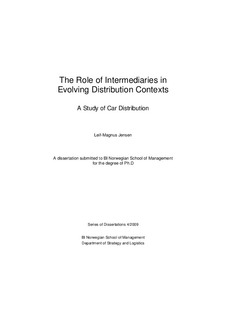| dc.description.abstract | This study contributes to the understanding of the role of intermediaries in contemporary distribution systems. These systems are characterised by an increased variety stemming both from changes in customer demand patterns, new technological possibilities and new organisational arrangements. The distribution systems have adapted to this variety in a number of ways: through the use of multiple channels to the consumer, through modularising approaches and through an increased emphasis on postponing activities until real demand is known. This complexity creates a range of opportunities for intermediaries, and this should be reflected in the roles they take on.
Here, it is suggested that the present theory on intermediaries in a distribution context, some of which dates back as far as the 1950s can usefully be developed by confronting it with a contemporary setting. The three elements employed for studying the setting are the structure of the distribution system, the coordination mechanisms used and the roles of intermediaries. By investigating each of these elements as well as their interactions it is possible to say a great deal about how intermediaries fit into contemporary distribution systems.
The dissertation is based on a case study of one intermediary in the car distribution sector. Variation is introduced by studying how this one intermediary relates to three importer systems for different manufacturers in particular and the car distribution system in Norway in general. This makes it possible to generate a number of role definitions for the intermediary in the setting, using the empirical setting and existing theory. The concept of a role is broadly defined to mean activities to serve a specific need for one customer, allowing each firm to take a number of roles.
The study shows new roles for intermediaries especially where they do not take title to goods and function as specialists essential for the efficient functioning of the distribution system. This contributes to understanding distribution systems through actors that have not traditionally been focussed.
Findings demonstrate that intermediaries are not only affected by the types of coordination used in the system, but that they can also be a prerequisite for certain types of coordination.
Finally, an alternative concept of position is developed which pulls together the understanding from the study and the literature. It is suggested that whereas roles describe what an intermediary does for a particular counterpart, position can usefully be employed to explain how an intermediary fits with the distribution system as a whole. | en |
